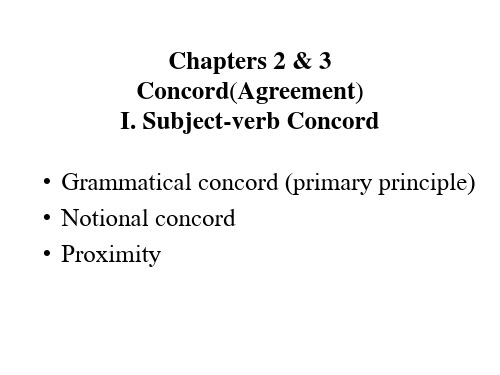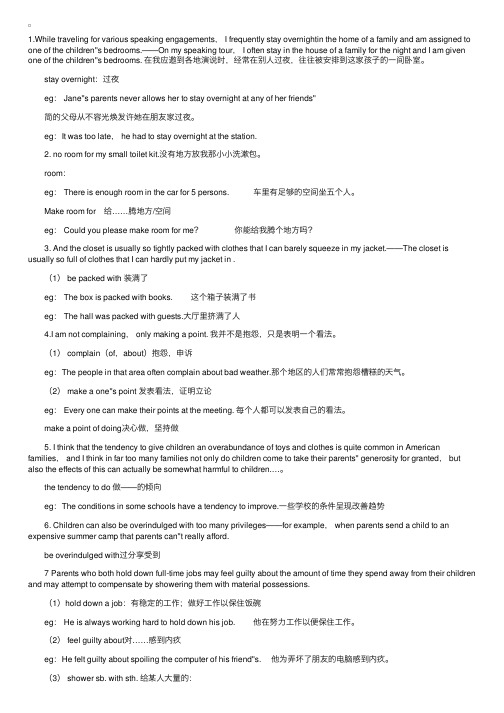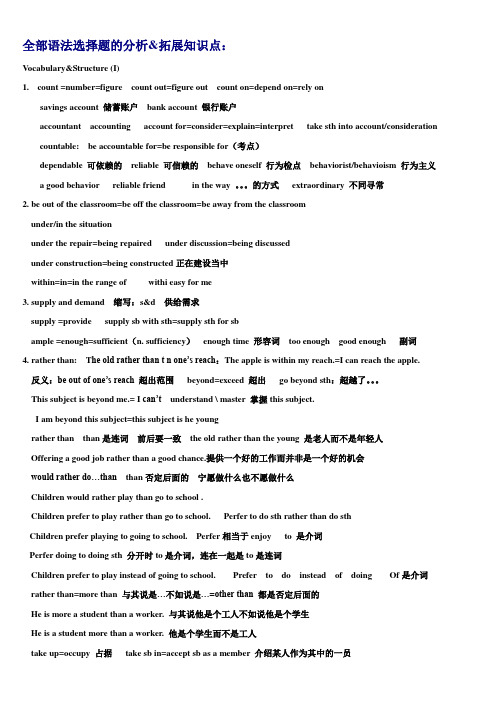华南师范大学英语专业大二语法课8-Verbs(1)
华南师范大学英语专业大二语法课11-Passive Voice

(or: filled with people) (‘people’ materialised)
4. The jar is filled with beer.
(‘beer’ as substance)
The Agent in a passive sentence Compare: 1. He was killed by the machine. 2. He was killed with a knife.
• His novels are not sold. (merely stating a fact)
Compare: • The door won’t shut. • The door is not shut.
• v. + doing (ger. of v.t./v.phr.) want,
? deserve, need, require, take, repay,
1. This point deserves (mentioning., being mentioned).
2. The shoe needs (mending., being mended).
3. The rule takes some (learning., being learned).
4. That won’t bear (thinking of., being thought of).
End of the term
Thank you!
? Passive Voice in imperative sentences
1. Move the table into the living room. Let the table (move; moved; be moved) into the living room.
大二常用语法知识点

大二常用语法知识点一、时态时态是指动词的时间表达方式,常用的时态有以下几种:1. 一般现在时:表示经常性的动作或客观事实,如:I go to school every day.(我每天去学校。
)2. 现在进行时:表示现在正在进行的动作,如:She is studying in the library.(她正在图书馆学习。
)3. 一般过去时:表示过去发生的动作或存在的状态,如:He watched a movie last night.(他昨晚看了一场电影。
)4. 过去进行时:表示过去某一时刻正在进行的动作,如:I was reading a book at that time.(那个时候我正在读一本书。
)5. 现在完成时:表示过去发生的动作对现在的影响或结果,如:I have finished my homework.(我已经完成作业了。
)6. 过去完成时:表示过去某一时间或动作之前已经完成的动作,如:She had already left when I arrived.(我到达时她已经离开了。
)二、语态语态是指动词所表示的动作或状态与主语之间的关系,常用的语态有以下几种:1. 主动语态:表示主语是动作的执行者,如:She wrote a letter.(她写了一封信。
)2. 被动语态:表示主语是动作的承受者,如:The letter was written by her.(这封信是她写的。
)三、主谓一致主谓一致是指主语与谓语在人称和数上要一致,常见的主谓一致规则有以下几种:1. 单数主语用单数谓语动词,如:He sings well.(他唱得很好。
)2. 复数主语用复数谓语动词,如:They play basketball every weekend.(他们每个周末打篮球。
)3. 有些集体名词可以作为单数或复数,根据具体语境来决定使用单数还是复数谓语动词,如:The team is/are practicing for the match.(这支队伍正在为比赛训练。
华南师范大学英语专业大二语法课4-Agreement

he/she?
Which word do we use? The owner and the captain refused to
abandon (his/their) burning ship. The owner and captain refused to
• The headmaster with the rest of the staff (was/were) having a heated discussion.
We use this word.
• His warmest admirer and severest critic was his wife.
The remains of the meal were/was fed churchyard.
That the earth is round is known to everyone. ( It is ... that ...)
We use this word. It is I who am to blame. It is me that is to blame.
II. Pronoun Concord
• in number • in gender • in person
Every passenger has to carry his luggage.
Five plus/and five (make/makes) ten.
Six times/multiplied by two (are/is) twelve.
We use this word.
华南师范大学成人高等教育试卷《大学英语》第二册考查测试题

华南师范大学成人高等教育试卷《大学英语》第二册考查测试题Grade:Level:Major:Class:I .Give the comparative degree and the superlative degree of the following adjectives and adverbs.(20 pionts)比较级最高级smoothimportantstupidearlyfamiliarwelltinyillslowlyII.Translaition(20 pionts)1.The docotor told me that your chance for getting well real soon were ten to one.2.The poor old man had been always about to paint a masterpiece, but had never yet begun it.3.she provided this service with a smile, a geniune smile, and a sense of humor.4.At that point, I decided to be a good employee and asked her if she needed help.5.As I stood close to her, my smile became harder to maintain.6.你学习越努力,你知道的就越多。
7.你操练英语越多,你学的越快。
8. 你们能赶得上那趟火车么?(in time)9.I tried very hard to lift the heavy box, .(结果确让它落到我的脚上)10.I hurried to the hospital, .(结果听说没有人受重伤)Ⅲ. Cloze (30 pionts)Directions: For each blank in the following passage, there are four choices marked A, B, C and D.Choose the one that is most suitable and write your answer by the corresponding letter on the Answer Sheet.Mr. and Mrs. king have lived in our town for nearly twenty years. They have a bookshop by the bus station. They’re __1__ to everybody and have a lot of friends. They often __2__ the poor students and sell them some books cheaply. So there’re many young men in their shop. Of course people __3__ them and their friends often call on (拜访) them and __4__ them. We can always hear their rooms are full of __5__ and quarrel.It was a Friday evening. Mr. and Mrs. King were going to have a picnic on the island the next __6__. It was a little far from our town. So they had to __7__ earlier than usual to catch a six o’clock train. After __8__ a few friends came to see them while they were cooking some __9__ and drinks for the picnic. Mr. king and his wife had to stop __10__ them. They talked a lot and few of them looked at the __11__ on the wall. Mr. and Mrs. King were anxious (焦急) but they couldn’t tell the visitors about it. The woman thought for a few __12__ and had an idea. She said to her __13__, “Oh, it’s eleven o’clock! You’d better stop talking, dear! Our guests are anxious to __14__!Mr. king heard this and stood up and said __15__ to the visitors and they left soon.1. A. had B. polite C. cold D. careful;2. A. help B. hurt C. hit D. watch3. A. know B. understand C. meet D. like4. A. play with B. fight with C. talk with D. catch up with5. A. cry B. shout C. noise D. laugh6. A. morning B. afternoon C. evening D. laugh7. A. go to work B. get up C. go to sleep D. open the shop8. A. breakfast B. lunch C. supper D. meal9. A. clothes B. bags C. books D. food10. A. receive B. to receive C. receiving D. to accept11. A. phone B. photo C. clock D. picture12. A. minutes B. days C. weeks D. months13. A. visitor B. husband C. brother D. father14. A. go home B. go to bed C. go shopping D. have a rest15. A. hello B. goodbye C. sorry D. nothingⅣ. Wrtiting(30 pionts)Introduce yourself (about 100 words)。
自考综合英语(二)下册详解第八课

1.While traveling for various speaking engagements, I frequently stay overnightin the home of a family and am assigned to one of the children''s bedrooms.——On my speaking tour, I often stay in the house of a family for the night and I am given one of the children''s bedrooms. 在我应邀到各地演说时,经常在别⼈过夜,往往被安排到这家孩⼦的⼀间卧室。
stay overnight:过夜 eg: Jane''s parents never allows her to stay overnight at any of her friends'' 简的⽗母从不容光焕发许她在朋友家过夜。
eg:It was too late, he had to stay overnight at the station. 2. no room for my small toilet kit.没有地⽅放我那⼩⼩洗漱包。
room: eg: There is enough room in the car for 5 persons. 车⾥有⾜够的空间坐五个⼈。
Make room for 给……腾地⽅/空间 eg: Could you please make room for me? 你能给我腾个地⽅吗? 3. And the closet is usually so tightly packed with clothes that I can barely squeeze in my jacket.——The closet is usually so full of clothes that I can hardly put my jacket in . (1) be packed with 装满了 eg: The box is packed with books. 这个箱⼦装满了书 eg: The hall was packed with guests.⼤厅⾥挤满了⼈ 4.I am not complaining, only making a point. 我并不是抱怨,只是表明⼀个看法。
2012专插本华师培训重点英语笔记

全部语法选择题的分析&拓展知识点:Vocabulary&Structure (I)1.count =number=figure count out=figure out count on=depend on=rely onsavings account 储蓄账户bank account 银行账户accountant accounting account for=consider=explain=interpret take sth into account/consideration countable: be accountable for=be responsible for(考点)dependable 可依赖的reliable 可信赖的behave oneself 行为检点behaviorist/behavioism 行为主义a good behavior reliable friend in the way 。
的方式extraordinary 不同寻常2. be out of the classroom=be off the classroom=be away from the classroomunder/in the situationunder the repair=being repaired under discussion=being discussedunder construction=being constructed正在建设当中within=in=in the range of withi easy for me3. supply and demand 缩写:s&d 供给需求supply =provide supply sb with sth=supply sth for sbample =enough=sufficient(n. sufficiency)enough time 形容词too enough good enough 副词4. rather than: T he old rather than t n one’s reach:The apple is within my reach.=I can reach the apple.反义:be out of one’s reach超出范围beyond=exceed 超出go beyond sth:超越了。
华南师范大学英语专业大二语法课6-Determiners

• little good coal,
postdeterminer + postdeterminer)
Are they acceptable?
• his this friend
• my a friend/a my friend
* his this friend (not acceptable)
this friend of his * my a friend/a my friend
Assignment
• Read Chapters 6-7, and do the exercises.
Determiners
What are determiners? Determiners refer to words which
are used in the premodification of a noun phrase and which typically precede any adjectives that premodify the head word of the noun phrase.
Predeterminers, central determiners and postdeterminers are not mutually exclusive.
• all the other students (predeterminer + central determiner + postdeterminer)
英语语法实训教程unit8 名词从句

Yours faithfully, Zhang Li
Sample 1
A) 亲爱的的先生或女士:
你们在二月八号羊城晚报上刊登了一则广告说,你们 需要招一位计算机程序员。我冒昧地请求你们给我这个职位。 随信附上我的个人简历。
我出生在广州,2005年毕业于广东商学院。本人具备良 好的计算机科学知识,掌握了编程、系统设计、分析以及系统 操作。我相信,我完全能胜任此工作。如能得到面试的机会, 我将感激不尽。
and operating systems. I believe 3) _th_a_t_y_o_u_w__ill_f_in_d__m_e__c_o_m_p_e_t_e_n_t
f_o_r _th_e__jo_b_. I shall be obliged 4)__if_y_o_u__g_ra_n_t_m__e_a_n__o_p_p_o_rt_u_n_it_y_f_o_r _in_te_r_v_ie_w___.
英语语法实训教程unit8 名词从句
Unit 8 Noun Clauses
名词性从句
I. Grammar Learning II. Grammar Practice
Grammar Learning
1. Introduction of Noun Clauses
2. Kinds of Noun Clauses
Department. Of course, the situation may change at any moment, and I would like to keep your resume handy ①in case there is a staff expansion or a resignation (①状语从句). Certainly, it would appear ②that you have excellent qualifications for the position ③you seek (②一级主语从句,③二级定语从句).
- 1、下载文档前请自行甄别文档内容的完整性,平台不提供额外的编辑、内容补充、找答案等附加服务。
- 2、"仅部分预览"的文档,不可在线预览部分如存在完整性等问题,可反馈申请退款(可完整预览的文档不适用该条件!)。
- 3、如文档侵犯您的权益,请联系客服反馈,我们会尽快为您处理(人工客服工作时间:9:00-18:30)。
Verbs
Part One FINITE VERB PHRASES I. Main Verbs (Full Verbs )
1. transitive, intransitive and linking verbs 2. regular and irregular verbs 3. dynamic and stative verbs 4. compound verbs
student.) • I have a ticket. (* I am having a
ticket)
Progressive aspect for be:
• Tom isBiblioteka being foolish.(= is talking or acting foolishly now)
• The children are being quiet. (= are playing quietly now)
• 4 types of time: present, past, future, past future
• 4 aspects: zero aspect (simple), continuous, perfect,
continuous perfect
• Number of Tenses = 4 x 4 = 16 (tenses)
link. v. + n.: • The actor looked his part. • He died a heroic death.
link. v. + adv.: • They kept together in the struggle. • The girl flushed up at the words.
S
VP
(Operator)
Predication
(Aux. V.)
Main V.
tense
(aspect)
I
can
I
am
work. working.
The tense of the finite VP
• The form of a Finite Verb Phrase (VP) changes in tense.
written by a boy of eleven.
seem/appear + infinitive
• He seems/appears to have many friends.
• I can’t seem(= seem unable) to get out of this bad habit.
ii) For instantaneous actions or for changes of state/position: hit, jump, tap, knock, open/close (a book/door), put (sth. on the table), take out, etc. -- for instantaneous actions
Dynamic and Stative Verbs
Dynamic verbs i) For continuous actions: drink, eat, read,
write, play, talk, work, walk, run, rain, snow, fly, etc. • I’m writing a letter. • They have been playing table tennis since breakfast. • They talked and talked until midnight.
The tense of the finite VP
• System 2 (since 1970’s): 2 tenses (Present & Past) + 2 aspects
(progressive & perfective) • In this system, ‘will/shall/+ m.v.’ is
• Acceptable to say: He has been a member of the club for three years.
Some verbs can be used for either continuous or instantaneous action.
• He is writing a novel. (continuous action)
• The room measures five meters by four. (= is/has an area of) (*...is measuring...)
Possible to say:
• The building is belonging to our university now. (but it will belong to sb. else next year)
System 2
Form of Finite VP → Tense (+ Aspect) Tense → Present/Past Aspect → Perfective and/or Progressive
There are 8 forms of the Finite VP in System 2
Simple present
Present tense
Past tense
Simple past
Perfective aspect
Progressive aspect
Verbs
Part One FINITE VERB PHRASES I. Main Verbs (Full Verbs ) II. Auxiliary Verbs III. Semi-auxiliary Verbs
• He is being funny. (= He is only joking, Don’t believe him.)
• She is just being polite. (She is pretending to admire your clothes, etc..)
• You are being stupid. (are not trying to understand)
• He was jumping to keep warm.
• Somebody is knocking at the door.
• He has been knocking at the door for a few minutes.
• (The progressive aspect indicates repetition of action.)
• Our university is owning the building now, but we will sell it in the near future.
Verbs for senses: feel, hear, see, smell, taste, and look (as link. v.), notice, observe (= notice)
link. v. + participle: • The small town remained unchanged. • They appeared amused by the story. • He seems laughing, but I can’t hear
him.
link. v. + prep. phr.: • He appeared at his ease. • It doesn’t read like an article
• He has been writing the novel for two months.
• He wrote the letter “E” on the blackboard. (instantaneous action)
• * He has written the letter “E” on the blackboard for two hours.
easy to chew). • He was born rich but died poor.
(cf. They lived poorly.)(=with little money) (cf. He was poorly dressed/paid.) • I’m feeling rather poorly today. (Br. E =ill)
linking verbs
link. v. + adj.: • When does the rent fall due? • The old man would never rest idle. • I dare say I stand innocent of any wrong. • The meat cooked tender(= not tough,
Present Tense, and ‘would + m.v.’ is Past Tense. The word ‘will/would’ is regarded as an auxiliary verb like ‘can’ or ‘may’ etc., not as a tense maker.
Part One FINITE VERB PHRASES
Sentence Finite Clause
Finite Verb Phrase
S
VP
(Operator) predication
All the men
have
done their best.
Finite verb phrase
